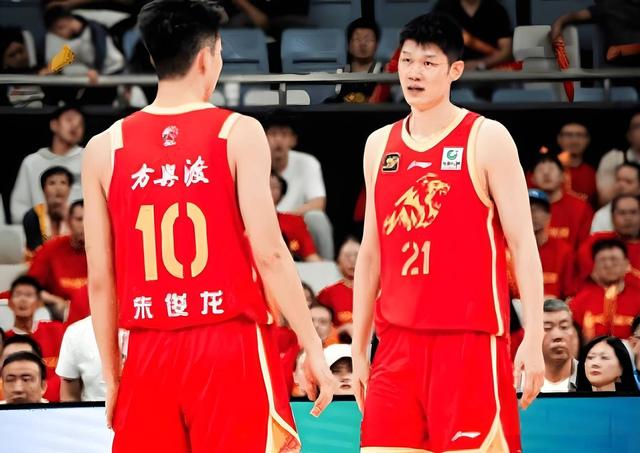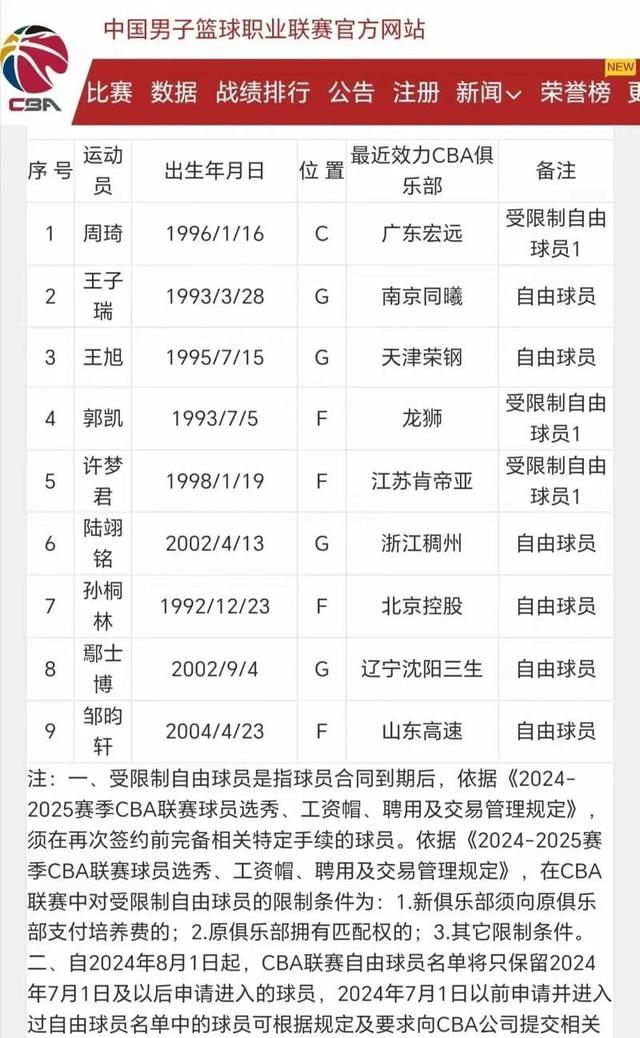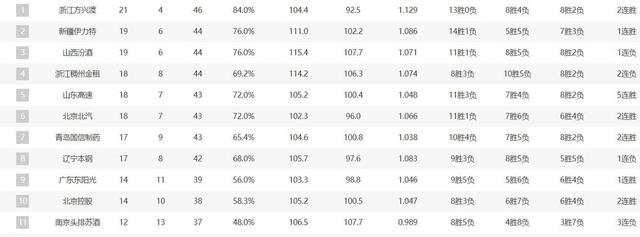Translation of the article content into English:
The CBA league has entered its "deep waters," and the performances of national players are like sharpened blades, revealing a clear hierarchy.
If there is one player who stands out as the biggest surprise this season, it must be Xu Jie.
With an average of 15.9 points and 7.9 assists per game, he has become the core brain of Guangdong team, firmly occupying the top tier.

On the other hand, Zhou Qi, due to his "stop-and-go" state, has become "pending."
The stratification of national players reflects the underlying concerns for the future of Chinese basketball: Is it a lack of talent depth, or do injuries lead them astray?
This time, the focus of the CBA regular season is not limited to any single match but rather a trend—national players' performances are being reshuffled on a seasonal basis.
Judging from the overall data of the first 28 rounds of the CBA, national players can be roughly divided into four tiers, with distinct levels.

Tier 1: Xu Jie stands alone, becoming the absolute core of Guangdong team
Xu Jie's performance is phenomenal.
This season, his average score has soared from 10.9 points last season to 15.9 points, and his assists have increased from 4.9 times to 7.9 times, directly ranking him sixth in the league's assist list.
This is not only a breakthrough in statistics but also a change in role.

From a "puzzle-type" player on the court to the organizer of the team, his coordination in the offensive end and his initiative in defense have injected vitality into Guangdong team.
Especially against strong teams, his calm command and key scoring almost serve as a barometer of Guangdong team's victories and defeats.
It can be said that Xu Jie has proven with his performance that he is not only the future of Guangdong team but also the hope of Chinese basketball.
Tier 2: Steady with room for improvement, the backbone of national players

Players in this tier show stability with room for improvement, becoming the mainstay of their respective teams.
Taking Zhang Ning as an example, his average points, rebounds, and defensive efficiency have all improved in Shanxi team, gradually becoming the core on both offense and defense.
Hu Jinqiu of Zhejiang team remains a powerhouse in the paint, with his stable scoring and rebounding ability giving the team more options on offense.
As the backcourt engine of Zhejiang team, Sun Minghui scores sharply and frequently delivers key assists.

Yang Hanshen and Gao Shiyan of Qingdao team also performed well, ensuring the team's competitiveness with their stable play.
Although these players' performances do not have "explosive moments," their roles within the team are indispensable.
Tier 3: Players plagued by injuries
Injuries are undoubtedly the greatest enemy of professional athletes.

This season, Zhao Rui, Wu Qian, Abudu Salamu, and others have had fluctuating states due to injuries, unable to deliver their best performances.
Especially Zhao Rui, who should have been the "pillar" of Zhejiang team's backcourt, has yet to find his best form due to injury issues.
Similarly, Abudu Salamu's injury greatly reduced Xinjiang team's competitiveness.
Injuries not only limit their performance but also affect the team's tactical system.

Tier 4: Potential to be tapped
Among young players, Xu Xin of Guangdong team has received much attention.
This power forward, who stands over 2.2 meters tall, may not have eye-catching average stats, but his potential and physical conditions are promising.
Perhaps, he needs more time and match experience to truly become a core force for the team.

Pending: Zhou Qi and Lin Wei
For Zhou Qi, "pending" is the most fitting evaluation.
This once highly anticipated power forward has shown an unstable performance this season.
Injuries and state fluctuations have prevented him from consistently contributing high-efficiency performances.

Although his talent remains at the top level of Chinese basketball, finding a stable state is key to his re-proving himself.
On the other side, Lin Wei has become a highlight among domestic players with an average score of 20+.
However, whether he can be selected for the national team still requires more time for verification.
Xu Jie's comprehensive explosion

Xu Jie's growth is not only an improvement in personal performance but also the result of Guangdong team's tactical adjustments.
His passing vision and calmness in critical moments have brought more changes to Guangdong team in matches.
Especially against strong teams, he often tears through the defense with breakthroughs and passes.
Such performances have elevated him from an ordinary national player to one of the future cores of Chinese basketball.

The impact of injuries on national players
The injury problems of Zhao Rui, Abudu Salamu, and others have exposed the immense pressure on players' bodies due to the dense schedule of the CBA.
This not only affects their individual performances but also makes the team struggle tactically.
Perhaps, how to improve players' physical management and rehabilitation mechanisms is an issue the entire league needs to consider.

Zhou Qi's loss of direction
As the "big brother" of the Chinese men's basketball team, Zhou Qi's performance this season is far from satisfactory.
Although his abilities are unquestionable, frequent absences and instability have cast a shadow over his future with the national team.
If Zhou Qi cannot regain his peak form, then the future of China's men's basketball frontcourt will be even more worrying.

Guangdong Team: Xu Jie
Scoring King: Xu Jie, averaging 15.9 points
Assist King: Xu Jie, averaging 7.9 assists
Rebound King: Yi Jianlian, averaging 9.8 rebounds

Zhejiang Team: Hu Jinqiu
Scoring King: Hu Jinqiu, averaging 23.1 points
Rebound King: Hu Jinqiu, averaging 12.5 rebounds
Assist King: Sun Minghui, averaging 6.2 assists

Qingdao Team: Yang Hanshen
Scoring King: Yang Hanshen, averaging 19.5 points
Rebound King: Yang Hanshen, averaging 10.3 rebounds
Team Data Comparison
Guangdong Team: Averaging 112.3 points, 25.6 assists, and a shooting percentage of 51.2%
Zhejiang Team: Averaging 110.8 points, 27.3 assists, and a shooting percentage of 50.9%
Xu Jie's progress is a combination of talent and effort, while Zhou Qi's "pending" is a tug-of-war between talent and reality. Behind the division of CBA national players into tiers lies the current state of Chinese basketball: dependence on star players, frequent injuries, and slow growth of young players.
Where is the next "Xu Jie"? And can the "Zhou Qis" stand up again? Perhaps, these questions are more worthy of consideration than the outcome of a single match.